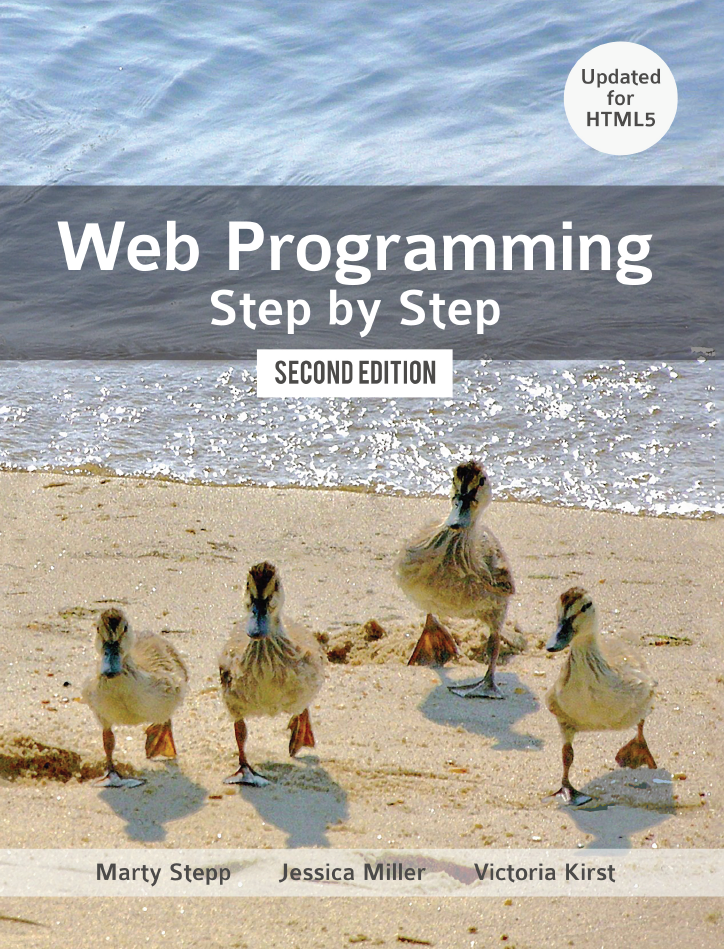Supplements
The following supplements are available to all instructors and students using the textbook:
References/Links from Each Chapter
The following page lists every link and reference given at the end of each chapter of the textbook, so that you don't have to type them in to use them.
Lecture Slides
split into individual lectures for our web programming course at the University of Washington (last updated July 21, 2009):
-
Lecture 1: The Internet and World Wide Web
(
 PDF)
PDF)
-
Lecture 2: Basic XHTML/CSS
(
 PDF)
PDF)
-
Lecture 3: More Basic XHTML/CSS
(
 PDF)
PDF)
-
Lecture 4: Page Sections (
div/span) and CSS Box Model
( PDF)
PDF)
-
Lecture 5: Floating and Positioning
(
 PDF)
PDF)
-
Lecture 6: Introduction to PHP
(
 PDF)
PDF)
-
Lecture 7: More PHP (arrays; expression blocks)
(
 PDF)
PDF)
-
Lecture 8: File Processing in PHP
(
 PDF)
PDF)
-
Lecture 9: HTML Forms
(
 PDF)
PDF)
-
Lecture 10: Form Posting
(
 PDF)
PDF)
-
Lecture 11: Form Validation and Regular Expressions
(
 PDF)
PDF)
-
Lecture 12 (special topic): Object-Oriented PHP
(
 PDF)
PDF)
-
Lecture 13: Introduction to JavaScript
(
 PDF)
PDF)
-
Lecture 14: The JavaScript HTML DOM; Timers
(
 PDF)
PDF)
-
Lecture 15: Unobtrusive JavaScript
(
 PDF)
PDF)
-
Lecture 16: Walking the DOM Tree
(
 PDF)
PDF)
-
Lecture 17: Event-Handling
(
 PDF)
PDF)
-
Lecture 18: More Events and JS Form Validation
(
 PDF)
PDF)
-
Lecture 19: Asynchronous JavaScript and XML (Ajax)
(
 PDF)
PDF)
-
Lecture 20: XML
(
 PDF)
PDF)
-
Lecture 21: Scriptaculous
(
 PDF)
PDF)
-
Lecture 22: Web Services
(
 PDF)
PDF)
-
Lecture 23: Introduction to Databases and SQL
(
 PDF)
PDF)
-
Lecture 24: SQL Multi-table Queries and Joins
(
 PDF)
PDF)
-
Lecture 25 (special topic): Cookies and Sessions
(
 PDF)
PDF)
-
Lecture 26: Web Security Basics
(
 PDF)
PDF)
-
Lecture 27 (special topic): Object-oriented JavaScript
(
 PDF)
PDF)
by chapter (last updated March 31, 2009):
-
Chapter 1: The Internet and World Wide Web
(
 PDF)
PDF)
-
Chapter 2: HTML Basics
(
 PDF)
PDF)
-
Chapter 3: CSS for Styling
(
 PDF)
PDF)
-
Chapter 4: Page Layout
(
 PDF)
PDF)
-
Chapter 5: PHP for Server-side Programming
(
 PDF)
PDF)
-
Chapter 6: HTML Forms and Server-side Data
(
 PDF)
PDF)
-
Chapter 7: Javascript for Interactive Web Pages
(
 PDF)
PDF)
-
Chapter 8: The Document Object Model (DOM)
(
 PDF)
PDF)
-
Chapter 9: Events and the Prototype Library
(
 PDF)
PDF)
-
Chapter 10: Ajax and XML for Accessing Data
(
 PDF)
PDF)
-
Chapter 11: Relational Databases and SQL
(
 PDF)
PDF)
-
Chapter 12: Web 2.0 and Scriptaculous
(
 PDF)
PDF)
-
Chapter 13: "Going Live": Taking a Professional Web Site Online
(
 PDF)
PDF)
-
Appendix A: Database Design
(
 PDF)
PDF)
Self-Checks and Programming Exercises
The following additional programming exercises are provided to supplement the book. They might serve as useful source material for creating assignments, labs, and other exercises. They are grouped into "units" of chapters covering related material. These problems are a work in progress; last updated March 12, 2009.
-
 Unit 1 Exercises
(Chapters 1-4: Basic HTML/CSS/layout)
Unit 1 Exercises
(Chapters 1-4: Basic HTML/CSS/layout)
-
 Unit 2 Exercises
(Chapters 5-6: Server-side Programming in PHP)
Unit 2 Exercises
(Chapters 5-6: Server-side Programming in PHP)
-
 Unit 3 Exercises
(Chapters 7-9: Client-side Programming in JavaScript)
Unit 3 Exercises
(Chapters 7-9: Client-side Programming in JavaScript)
-
 Unit 4 Exercises
(Chapters 10-11: Ajax, SQL, and Databases)
Unit 4 Exercises
(Chapters 10-11: Ajax, SQL, and Databases)
Programming Labs and Discussion Section Handouts
(section handouts last updated June 18, 2011 with many new problems in each section)
We use these handouts in our course at Washington as part of weekly closed lab sessions in which students work for roughly an hour at computers solving web programming problems. The discussion section handouts are for our weekly hour-long TA-led discussion sections in which our teaching assistants lead students through a set of problems on one shared computer with a projector.
Homework Assignment Specification Ideas
Sample Exams
(Exams are password-protected. Instructors, please contact us for access.)
Code Files Shown in the Textbook
Databases Used in the Textbook
Ruby on Rails (supplemental slides and material)
These materials were used for optional weekly sessions about Ruby on Rails in our Spring 2009 course at Washington. The materials were created by teaching assistants Ryan Tucker and Kelly Dunn. Many thanks to Ryan and Kelly for these great materials!
Other Resources

